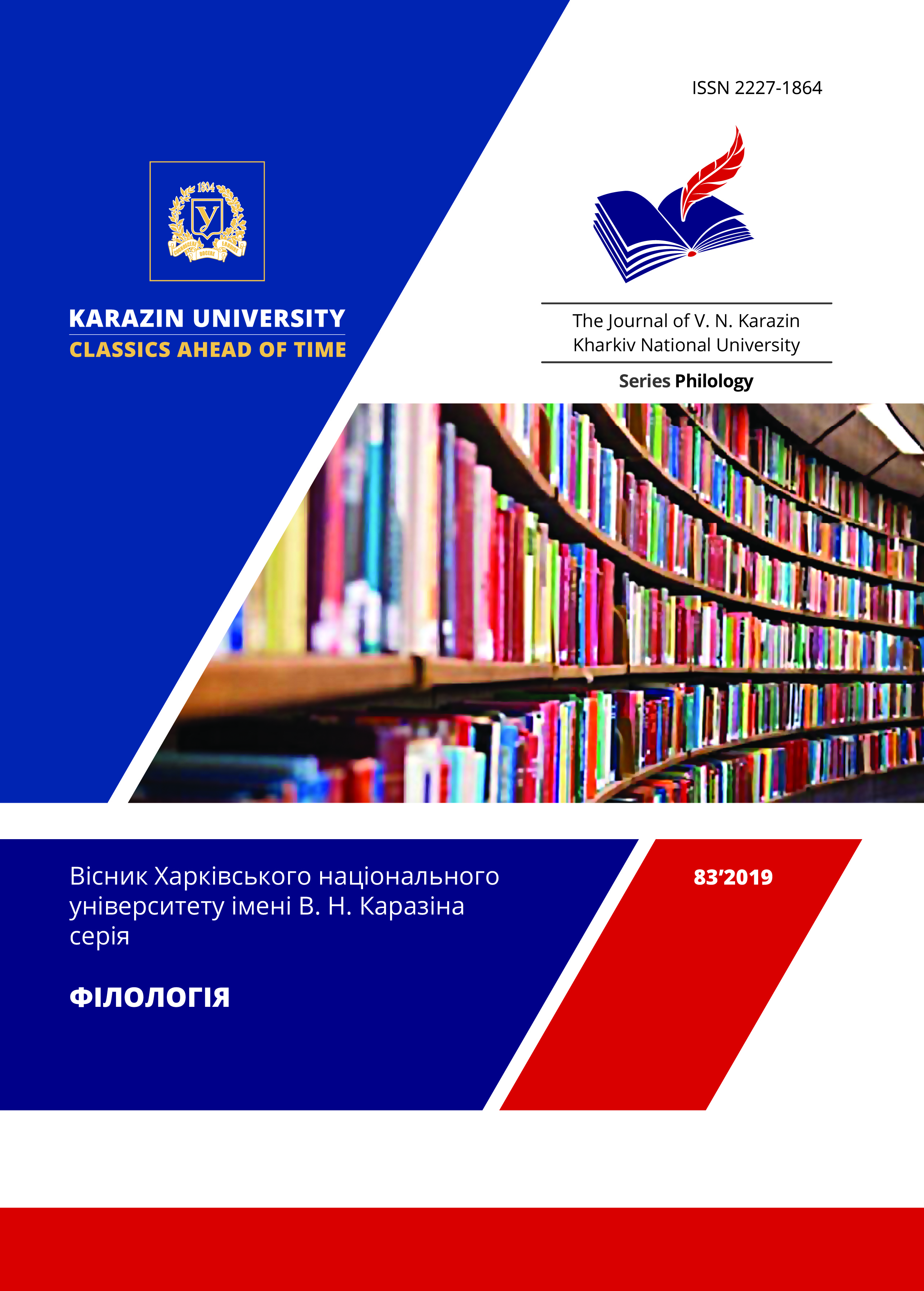The functionality of classic plots and their reminiscences in the writer’s reception
Abstract
Being a polysemantic phenomenon, the literature is in a systematic process of constructive transformations of previous experience, based on the transit of centuries-old traditions, on the functioning of TTP (theory of traditional plots). The purpose of our work is to analyze the general problems of reception, transformation and new generation of test sequels by the writers by juxtaposition of Gogol’s and Bulgakov’s novels. These methodologies provided a new perspective on the reception and functionality of classic designs. The use of the receptive platform, the theory of TТР, the theory of intertextuality, narratology, etc., have provided the basis for new, unexplored, scientific findings. The well-known traditional motives, plots, characters occupy their niche in the theory of transitivity, without losing relevance due to the endless dialogue «author – recipient». This cultural transit has its regularities, which are engraved in the receptive segment of the science of literature, beginning with the problem of understanding the text, which goes back to deciphering the exegesis. Bulgakov, as a classic writer, formed in a time of crisis and shaky space, not only had to inherit the tradition, but also zealously protect it from the unmotivated literary blasphemy of radically new times. It is in his creative attitude to classical material and his alterations that he is a striking representative of the «caste of the guardians of tradition». His latest novel, incorporating a tremendous literary legacy – from legends to classical material – undoubtedly gives us the right to identify this main Bulgakov text as a meta-romance.
The functionality of classical plots and their reminiscences at the reception of the writer appeal to the question of intertextuality. In the context of TCT theory, we examined M. Gogol’s influence on M. Bulgakov’s work. The update of the Gogol text, made possible by numerous microstructural components. In addition, we drew attention to the theatrical interpretations of M. Gogol, which veiled the issue of actualization of classical material. In the feuilleton «Chichikov Adventures», the writer contaminated M. Gogol’s most colorful characters using the past ridiculed the realities of the day.
Downloads
References
Aristotel (1983). Poetika // Aristotel. Sochineniya: v 4 t. [Aristotel. Works: in 4 vol]. Moscow : Mysl, Vol. 4, pp. 645–680.
Belecki, A. I. (1961) Russkaya literatura i antichnost. Vzaimosvyazi i vzaimodejstviya nacionalnyh literatur. [Belecki A. The Russian literature and the Antiquity] [The interconnexion and the interaction of national literatures]. Moscow: Nauka, pp. 174–179.
Gromyak, R. (2005) Problema vklyuchennya ukrayinskih tradicij u suchasnu naratologiyu. [Grom’yak R. The problem of the introduction of Ukrainian traditions in the modern naratology]. Studia methodologica: nauk. zb. Ternopil: TNPU. Vol. 16, pp. 10–20.
Dzyuba, I. (1994) Bileckij i Potebnya. (Ideyi O. Potebni v pracyah I. Bileckogo). [Dzyuba I. The ideas of O. Potebnia in I. Bilestski’s works] Slovo i chas. № 11/12, pp. 9–16.
Diltej, V. (1912) Tipy mirovozreniya i obnaruzheniya ih v metafizicheskih sistemah. [Diltej V. The types of mentality and theyr presence in methaphisical systems]. Novye idei v filosofii: sb. statej. SPb.: Obrazovanie,. №1, pp. 47–98.
Nauman, M. (1984) Literaturnoe proizvedenie i istoriya literatury. [Nauman M. Literrary artworks and the history of litterature]. Moscow : Raduga.
Potebnya, A.A. (1989) Slovo i mif. [Potebnya A. The word and the Myth] Moscow : Pravda.
Potebnya, O. (1996) Dumka j mova (fragmenti). [Potebnya A. The thought and the word (fragments)] Slovo. Znak. Diskurs. Antologiya svitovoyi literaturo-kritichnoyi dumki XX st. Lviv: Litopis, pp. 25–39.
Franko, I.Ya. (1976) Internacionalizm i nacionalizm u suchasnih literaturah. [Franko I. Internationalisms and nationalisms in the modern literature] Franko I.Ya. Zibrannya tvoriv: v 50 t. Kiyiv: Nauk. dumka,. Vol. 31, pp. 33–44.
Chervinska, O.V., Zvarich, I.M., Sazhina, A.V. (2009) Psihologichni aspekti aktualnoyi recepciyi tekstu [Chervinska O. Psyhological aspects of the texts’ actual reception]: Teoretiko-metodologichnij poglyad na suchasnu praktiku slovesnoyi kulturi: nauk. posibnik. Chernivci: Knigi–HHI.
Chervinska, O.V. (2008) Receptivni resursi tekstu ta psihologichnij potencial chitacha. [Chervinska O. Receptive resources to the text and the psychological potential of the reader]. Pitannya literaturoznavstva: nauk. zb. Chernivci: Ruta,. Vol. 76, pp 109–116.
Eko, U. (2003) Iskusstvo i krasota v srednevekovoj estetike.[Eko U. Art and beauty in medieval aesthetics].SPb.: Aletejya.
Yauss, H.R. (1995) Istoriya literatury kak provokator literaturovedeniya. [Yauss H. The history of literature as a provocator of literary criticism]. Novoe lit. obozrenie.. № 12, pp. 34–84.
Gorski K. (1973) Aluzja literacka. Istota zjawiskai j ego typologia. [Gorski K. Literary allusion. The essence of the phenomenon and its typology]. Stylistyka polska. Warszawa,.
Jassus, H. R. (1967) Literatur geshihteals Provacation Literaturwishssenshaft. [Jassus H. Literature served as Provocation of Literary Studies]. Konstanz




